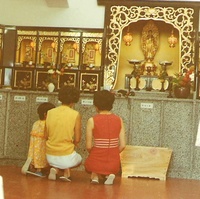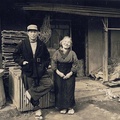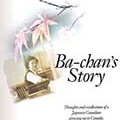In the early 50’s my older brother, Kunio and my two older sisters, Masayo and Meiko ventured back to Canada despite what my parents kept saying to us “Wait until you all graduate with proper education.” In 1955 at age 23, I also decided to return to Canada. Did I leave Japan through careful thinking? I was always sitting on the fence and with the eventuality of the American Forces leaving, I could not imagine myself fitting into the reality of life in Japan. My deep childhood memories and dreams of a life in Canada lured me back home. Things were looking bright for us in Canada. Since 1949 the Canadian government had allowed us to vote. Early 1955 at the Uruzu Government Office I renounced my Japanese citizenship as it was mandatory for those returning. No longer holding dual citizenship, I happily headed home towards Toronto.
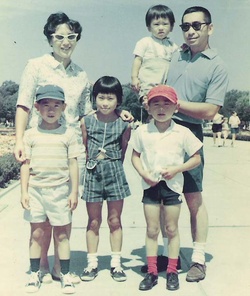
Maikawa family: Frank & Susan and our four children; Theresa, Ian, Alan (with red cap) and Gordon (youngest). August 3, 1969 at Centre Island, Toronto, Ontario.
Once in Ontario, I was not impressed with the flatness of the terrain compared to B.C. and Japan. But my family, former Cumberland and Lemon Creek friends were extremely kind to me which made me feel welcome. I resided with Wakiko and Kiheiji Kiyonaga, then lived with Tokugi and Dorothy Suyama, until I got married to Frank Maikawa. I am truly grateful to them for helping me obtain employment and the encouragements to further my education. There was something I liked about Frank so I was the one who did the proposing! I’m not saying what it was—it’s my secret—ha, ha. Changing the subject—I worked at Bell Canada, later at University of Toronto School of Social Work and then attended Teachers College.
Frank and I moved to Belleville, Ontario where Frank enjoyed a fulfilling career at Nortel for 38 years, involved in various electronics engineering design work and later as manager of Customer Technical Assistance Service. I became a busy mother of a daughter, Theresa and 3 sons, Ian, Alan and Gord but managed to attend day school at Loyalist College and successfully completed the Early Childhood Education Programme.
In 1971 I was fortunate enough to be able to take my daughter and return to Japan. Papa suddenly passed away several months before my visit. I deeply regret not having seen Papa since 1955 when I left Japan 16 years earlier. I just wanted to have one more nice cup of tea with him! When we returned to Canada, Mama came with us. Mama was not really satisfied with a landed immigrant status so she eventually memorized her citizenship oath to become a Canadian. She had a happy contented life and lived until she was almost 93.
As for employments, I worked for the Ministry of Social Service Day Nursery School and Hasting County Board of Education’s Special Educational Institutes helping children with learning disabilities (hearing/mental/physical) in the elementary panel. Although I retired 5 years ago I still enjoy volunteering a few days a week at the Beaver Valley Community School in Thornbury nearby, where Frank and I live. I chose to be an Early Childhood Educator since I believe that you must start to instill the proper sense of values at the earliest stages of growth, teaching the youngsters to practice self discipline, self esteem and honesty. A lesson I try to pass on is one that I have learned well during my life, that is, decisions we make whether right or wrong have a consequence which must be faced and will become our destiny. I reflect on the most difficult decision my parents had to make after the war and the way our family had to deal with the consequences. This was indeed one of the major turning points in my life and it has deeply influenced my thinking. You can therefore understand my desire to be a good role model for the students and to plant a good seed with a sense of humour. There is more to education than the 3 R’s—“reading, ‘riting and ‘rithmatic”. Our goal as educators is to send our young people into the world with a value system of tolerance and understanding, free from jealousy and discrimination. It is a tremendous privilege to be associated with others in the educational system and to promote and instill these values from different cultural perspectives. Fortunately, Frank was brought up with the same values as mine so we were in tune bringing up our four children and they all grew up into fine adults. We see it reflected in our grandchildren who give us great joy.
In 1989 and again in 1993 it was an honour for me to be able to participate and interpret for the Hasting County School Board of Education when a 24 member Japanese Educators from Japan visited us to observe the Canadian School methods of teaching. They in turn pointed out their views of teaching. The feeling of acceptance and togetherness on both sides were most heartwarming experience. At the appreciation evening, hosted by the Japanese educators, mutual gratitude and friendship were established spontaneously between everyone capping off a very memorable week. A recognition letter from Ronald Denyes, Director of Education, thanking me for being an excellent ambassador for the Board made all my efforts worthwhile. I found life very interesting and fascinating—from Sunday school teaching to interpreting for Japanese business people, from teaching night school of Ikebana, to give lessons in Japanese language to Canadian business people, from instructing teachers who were going to Japan to teach English and helping Canadian exchange students returning from Japan to retain their newly acquired Japanese language.
When I think as to who had the most profound impact on me in who I am today, I would say that it was my parents with their sacrificial labour, love and guidance. I have added an attachment to this paper, my parent’s old fashion sense of values that I embrace and practice. I also recognize the influence of the Cumberland and ghost town teachers, Canadian educators, along with the Japanese male dominated teachers and professors. They were good role models, showing how to maintain peace in one’s heart under adverse circumstances, acknowledging that life brings calamities as well as good favourable things, embracing life with optimism and enthusiasm, encouraging us to become well educated excelling in our professions and reminding us to bring joy into one’s life each day.
There have been many turning points and influences in my life of 60 plus years but one of the most dramatic occurrences happened on September 22, 1988. Thanks, in large part, to the perseverance of the wise older generation Nisei and activist Sansei to obtain equality and justice, Prime Minister Brian Mulroney paved the way and showed the world that what was done to the Japanese Canadians was wrong. He issued a Canadian Government Apology Certificate in writing with his signature to each of us (my personal apology letter was received dated January 22, 1990). I respect him for that and since then I was finally proud to call myself Canadian—not just a Canadian, but a “shi a wa se” (fortunate, lucky) Japanese Canadian. Me, the little girl they called Ochapei, had not only figured out how to survive, but turned hardships into strengths. I felt very fortunate to have contributed and enhanced the quality life of Canadians by sharing my Japanese ancestral heritage background as Canada progresses positively towards multi-culturalism. It is my sincere hope that I will still be able to serve faithfully as a devoted caretaker to enrich and provide a base to reflect upon, a path to peace and harmony in the present Canadian society and for future generations.
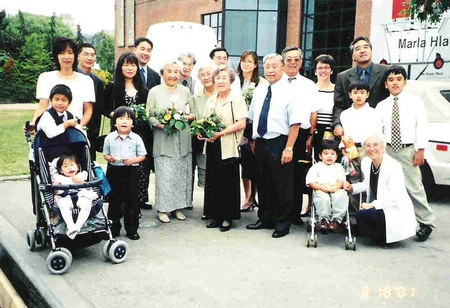
Canada 2001: Maikawa extended family at Alan's wedding, August 18, 2001 (Gerald and Sandy's family is not included)
To read her the additional recollections, photographs, and poems >>
**Editor's Note: Upon the author's request, the additional story without familly tree was uploaded on January 2011
**All photographs are courtesy of the author.
© 2010 Yoshimi Susan Maikawa


